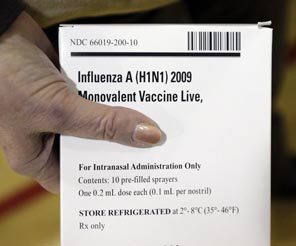Dr. Weeks’ Comment: Again, as smug as I feel saying “I told you so.” , nonetheless this was a tragic waste of money. Governments misled by scientists whose money trail was obscure and remember the mass hysteria fueled by artificial shortages… that was marketing.
End of article: they are getting ready to do it all over again. Every year it is the same thing.
No none wants to talk about the cheap and effective preventive measure: vitamin D3, vitamin A, vitamin C… exercise. Its frustrating enough to make me want to go buy stock in these companies…
Fading H1N1 scare leaves vaccine surplus
The influenza pandemic that swept the globe and fueled concern that millions would die has led to an unprecedented glut of vaccine as fewer people than expected have sought immunization.
Swine-flu toll
About 13,000 deaths worldwide from the H1N1 influenza have been confirmed since it was first identified in Mexico and the United States in April, the WHO said last week.The figure includes 1,045 deaths in Europe and about 10,000 in the United States.
[BSW note: these are NOT accurate figures as testing was prohibited months ago in order to not reveal the embarrassingly low incidence of h1N ]
Seasonal influenza kills as many as 500,000 people around the world annually, according to the WHO.
Bloomberg News
![]()
LONDON ”” The influenza pandemic that swept the globe and fueled concern that millions would die has led to an unprecedented glut of vaccine as fewer people than expected have sought immunization.
Governments worldwide are left with surpluses of H1N1 vaccine due to sagging demand. Many are selling or donating the excess or slashing pending orders.
The world’s biggest vaccine makers ”” GlaxoSmithKline, Sanofi-Aventis, Baxter International, Novartis and CSL ”” are seeing a potential $7.6 billion sales windfall shrink, analysts said.
The first flu pandemic in 40 years prompted a worldwide scramble in 2009 to secure supplies of vaccine against the H1N1 virus. When the disease turned out to be milder than predicted, people already wary about the shot’s safety hesitated to get inoculated, and demand declined.
“I’m very sad that we spent the money like this, very inefficiently,” said Wolfgang Wodarg, a doctor who served in Germany’s Parliament until September and now is on the Council of Europe. “The governments could have put more questions forth.”
The Strasbourg, France-based council will debate Wodarg’s proposed resolution Jan. 28 that governments made unnecessary vaccine purchases after drugmakers, seeking to boost sales, influenced them.
Claire Brough, a spokeswoman for London-based Glaxo, said the allegation was “without warrant.”
French Socialist party spokesman Benoit Hamon and Democratic Movement head Francois Bayrou criticized Prime Minister Nicolas Sarkozy’s government for spending millions on vaccines that won’t be used.
Government officials and the World Health Organization (WHO) say it was impossible to predict the course of the virus when vaccine decisions were made.
Public-health experts also warned against dismissing the threat from the virus, saying it may return in a more-virulent form this year or in coming flu seasons.
“We are not out of the woods yet with this virus and it will be rather foolish for everyone to say ‘That’s it,’ ” said John Oxford, professor of virology at Queen Mary’s School of Medicine and Dentistry in London.
Most large European countries have now protected no more than 10 percent of their populations against the pandemic virus, after ordering enough vaccine for most or all of their residents. One shot is required for most people, instead of the two doses expected when most orders were placed.
Analysts at Morgan Stanley had predicted $3.6 billion in revenue from the vaccine for Glaxo in the last quarter of 2009 and the first three months of 2010. Actual sales may be as much as 15 percent lower, the firm said in a report last month.
After the WHO declared a flu pandemic in June and thousands of people began getting ill, alarm spread in some countries. In July, England’s top doctor told the National Health Service to prepare for as many as 65,000 deaths.
Since the near-panic has subsided, Britain reduced its expected death toll to 1,000 and officials have begun debating when to shut the pandemic flu service.
Almost all Americans who want the vaccine can now obtain it and the U.S. government is running newspaper advertisements urging them to do so.
Next month WHO representatives will meet to determine which virus strains to include in the 2010-2011 seasonal-influenza vaccine for the Northern Hemisphere. A decision to include the pandemic strain in next year’s seasonal-flu shot may make the separate pandemic shot unnecessary and further limit its market.


